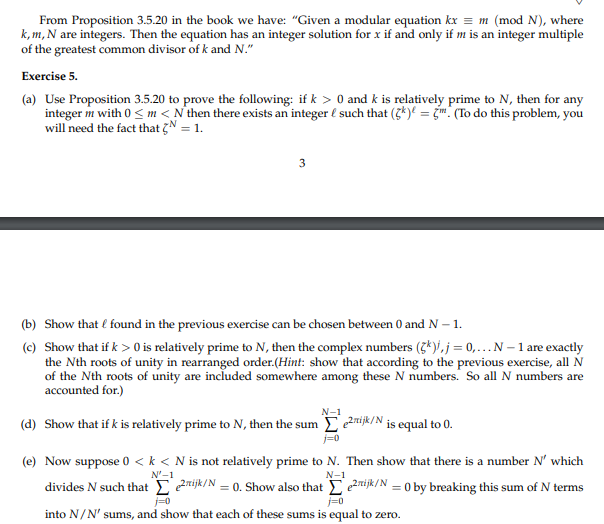Exercise 5. (a) Use Proposition 3.5.20 to prove the following: if k> integer m with 0 ≤ m < N then there exists an integer will need the fact that N = 1. 3 0 and k is relatively prime to N, then for any such that (k)= m. (To do this problem, you (b) Show that I found in the previous exercise can be chosen between 0 and N - 1. (c) Show that if k> 0 is relatively prime to N, then the complex numbers (k), j = 0,... N - 1 are exactly the Nth roots of unity in rearranged order.(Hint: show that according to the previous exercise, all N of the Nth roots of unity are included somewhere among these N numbers. So all N numbers are accounted for.)
Exercise 5. (a) Use Proposition 3.5.20 to prove the following: if k> integer m with 0 ≤ m < N then there exists an integer will need the fact that N = 1. 3 0 and k is relatively prime to N, then for any such that (k)= m. (To do this problem, you (b) Show that I found in the previous exercise can be chosen between 0 and N - 1. (c) Show that if k> 0 is relatively prime to N, then the complex numbers (k), j = 0,... N - 1 are exactly the Nth roots of unity in rearranged order.(Hint: show that according to the previous exercise, all N of the Nth roots of unity are included somewhere among these N numbers. So all N numbers are accounted for.)
Elements Of Modern Algebra
8th Edition
ISBN:9781285463230
Author:Gilbert, Linda, Jimmie
Publisher:Gilbert, Linda, Jimmie
Chapter5: Rings, Integral Domains, And Fields
Section5.2: Integral Domains And Fields
Problem 12E
Related questions
Question
Please do Exercise 5 part A-D and please show step by step and explain

Transcribed Image Text:From Proposition 3.5.20 in the book we have: "Given a modular equation kx = m (mod N), where
k, m, N are integers. Then the equation has an integer solution for x if and only if m is an integer multiple
of the greatest common divisor of k and N."
Exercise 5.
(a) Use Proposition 3.5.20 to prove the following: if k> 0 and k is relatively prime to N, then for any
integer m with 0 <m<N then there exists an integer & such that (k)= m. (To do this problem, you
will need the fact that N = 1.
3
(b) Show that I found in the previous exercise can be chosen between 0 and N - 1.
(c) Show that if k> 0 is relatively prime to N, then the complex numbers (k), j = 0,... N - 1 are exactly
the Nth roots of unity in rearranged order.(Hint: show that according to the previous exercise, all N
of the Nth roots of unity are included somewhere among these N numbers. So all N numbers are
accounted for.)
N-1
(d) Show that if k is relatively prime to N, then the sum
e2ijk/N is equal to 0.
j=0
N'-1
(e) Now suppose 0 <k < N is not relatively prime to N. Then show that there is a number N' which
rijk/N = 0. Show also that Σe2rijk/N = 0 by breaking this sum of N terms
into N/N' sums, and show that each of these sums is equal to zero.
divides N such that
j=0
Expert Solution
This question has been solved!
Explore an expertly crafted, step-by-step solution for a thorough understanding of key concepts.
Step by step
Solved in 2 steps with 3 images

Recommended textbooks for you

Elements Of Modern Algebra
Algebra
ISBN:
9781285463230
Author:
Gilbert, Linda, Jimmie
Publisher:
Cengage Learning,


Elements Of Modern Algebra
Algebra
ISBN:
9781285463230
Author:
Gilbert, Linda, Jimmie
Publisher:
Cengage Learning,
